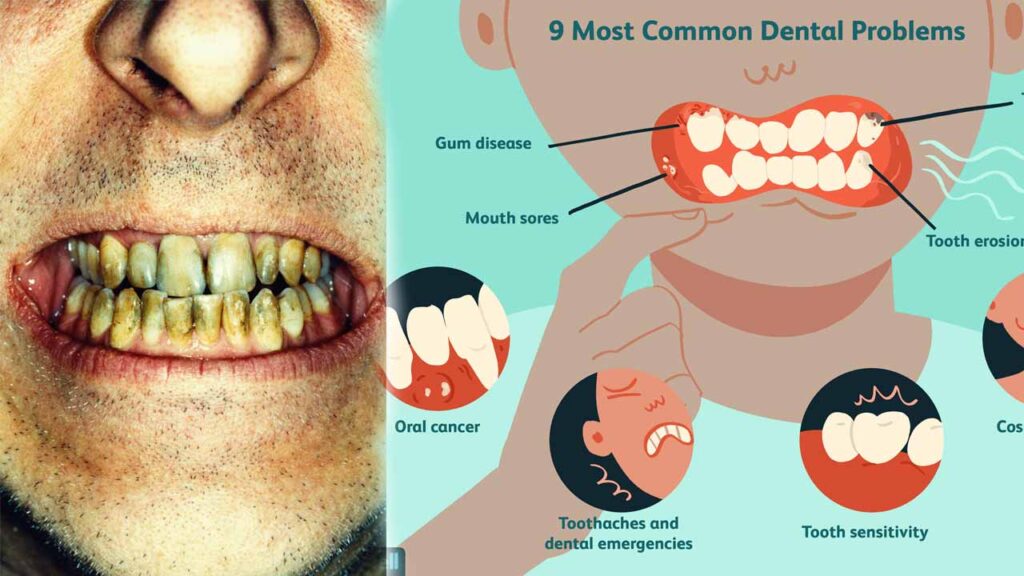Dental health refers to the overall condition of the teeth, gums, and mouth. Good dental health means having healthy teeth that are free of decay and disease, healthy gums that are free of inflammation and bleeding, and a mouth that is free of bad breath and infection.
Good dental health is essential for maintaining overall health and well-being. Poor dental health can lead to tooth decay, gum disease, bad breath, and even tooth loss. Additionally, research has linked poor dental health to a range of other health conditions, including heart disease, stroke, and diabetes.
Poor dental health can be caused by a range of factors, including poor oral hygiene, an unhealthy diet, lifestyle factors like smoking and alcohol consumption, genetics, age, medical conditions and medications, and dental treatments and procedures.
Common Causes of Poor Dental Health
A. Poor oral hygiene
Not brushing and flossing regularly
Not brushing and flossing regularly can allow plaque and bacteria to build up on the teeth and gums, leading to tooth decay and gum disease.
Using the wrong toothbrush or toothpaste
Using the wrong toothbrush or toothpaste can also contribute to poor dental health. A toothbrush that is too hard or too soft can damage the teeth and gums, and toothpaste that is too abrasive can erode the tooth enamel.
Not cleaning the tongue
Many people neglect to clean their tongues, which can also harbour bacteria and contribute to bad breath.
B. Unhealthy diet
High sugar intake
High sugar intake can contribute to tooth decay by feeding the bacteria that cause cavities.
Acidic foods and drinks
Acidic foods and drinks can erode the tooth enamel, making the teeth more susceptible to decay and sensitivity.
Lack of nutrients essential for dental health
A diet that is lacking in essential nutrients like calcium, vitamin D, and phosphorus can weaken the teeth and make them more prone to decay and disease.
C. Lifestyle factors
Smoking and tobacco use

Smoking and tobacco use can contribute to poor dental health by staining the teeth, causing bad breath, and increasing the risk of gum disease and tooth loss.
Alcohol consumption
Excessive alcohol consumption can also contribute to poor dental health by dehydrating the mouth and increasing the risk of gum disease and tooth decay.
Stress and poor sleep habits
Stress and poor sleep habits can contribute to poor dental health by weakening the immune system and increasing the risk of infection and inflammation in the mouth.
Other Factors Contributing to Poor Dental Health
A. Genetics
Some people are more prone to dental problems than others due to genetic factors.
B. Age
As we age, our teeth and gums become more susceptible to decay and disease.
C. Medical conditions and medications
Certain medical conditions and medications can also contribute to poor dental health by causing dry mouth, reducing saliva flow, and increasing the risk of infection and inflammation.
D. Dental treatments and procedures
Some dental treatments and procedures, like orthodontic treatment or wisdom tooth removal, can also contribute to poor dental health if not performed properly or if proper aftercare is not followed.
Consequences of Poor Dental Health
A. Tooth decay
Tooth decay is one of the most common consequences of poor dental health. It occurs when the bacteria in the mouth produce acid that erodes the tooth enamel, leading to cavities.
B. Gum disease
Gum disease is an infection of the gums that can lead to bleeding, inflammation, and even tooth loss if left untreated. It is caused by the build-up of plaque and bacteria on the teeth and gums.
C. Bad breath
Poor dental health can also lead to bad breath, or halitosis, which can be embarrassing and negatively impact social interactions.
D. Tooth loss
Untreated tooth decay and gum disease can eventually lead to tooth loss, which can have a significant impact on the appearance and function of the mouth.
E. Infection and inflammation
Poor dental health can also lead to infection and inflammation in the mouth, which can spread to other parts of the body and negatively impact overall health.
Prevention and Treatment of Poor Dental Health
A. Good oral hygiene practices
The most effective way to prevent poor dental health is to practice good oral hygiene habits, including brushing and flossing regularly and using the right toothbrush and toothpaste.
B. Healthy diet
A healthy diet that is low in sugar and high in essential nutrients like calcium and vitamin D can also help prevent dental problems.
C. Regular dental check-ups and cleanings
Regular dental check-ups and cleanings are important for identifying and treating dental problems before they become more serious.
D. Dental treatments and procedures
In some cases, dental treatments and procedures like fillings, crowns, and root canals may be necessary to treat dental problems and restore oral health.
healthcareDental health is an important aspect of overall health and well-being. Take control of your dental health with our top-quality dental health care products. Say goodbye to painful and inconvenient dental issues and hello to a brighter, healthier smile.
These products are designed with the latest technology and are made from premium materials, ensuring that you get the best results. Whether you’re looking for a solution for sensitive teeth, gum health, or just want to keep your smile sparkling, our dental health care products have got you covered.
Tired of hiding your smile due to yellowing, stained, or sensitive teeth?
ProDentim is here to help. This advanced formula whitens and strengthens your teeth, while also reducing sensitivity and promoting oral health. Say goodbye to expensive and painful dental treatments, and start enjoying a bright, confident smile with ProDentim.
Click Here to Try ProDentim now and see the results for yourself!
Struggling with tooth sensitivity, gum problems or bad breath?
Dentitox Pro is the solution you need. This natural, effective formula helps to clean and strengthen your teeth and gums, giving you a brighter, healthier smile. Dentitox Pro is made with the finest ingredients and is free from harmful chemicals, making it safe and gentle for everyday use. Say goodbye to pain and embarrassment, and start enjoying a confident, beautiful smile with Dentitox Pro.
Click Here to Order now and get 20% off your first purchase!
Click Here for Professional Teeth Whitening
FAQ About What Causes Poor Dental Health
A. How often should I brush and floss my teeth?
It is recommended that you brush your teeth at least twice a day and floss at least once a day.
B. How can I tell if I am using the right toothbrush and toothpaste?
Consult with your dentist or dental hygienist to determine the best toothbrush and toothpaste for your individual needs.
C. Is sugar the only thing that causes cavities?
No, cavities can be caused by a variety of factors, including acidic foods and drinks, poor oral hygiene, and a lack of essential nutrients.
D. Can poor dental health affect my overall health?
Yes, poor dental health has been linked to a range of other health problems, including heart disease, stroke, and diabetes.
E. How can I improve my dental health?
To improve your dental health, practice good oral hygiene habits, eat a healthy diet and schedule regular dental check-ups and cleanings with your dentist.
Poor dental health can be caused by a range of factors, including poor oral hygiene, an unhealthy diet, lifestyle factors like smoking and alcohol consumption, genetics, age, medical conditions and medications, and dental treatments and procedures.
Preventing and treating poor dental health is important for maintaining overall health and well-being, and can help prevent serious dental problems and related health conditions.
By taking care of your teeth and gums and making regular dental check-ups and cleanings a priority, you can help prevent and treat poor dental health and enjoy a healthy and beautiful smile for years to come.


1 thought on “What Causes Poor Dental Health?”